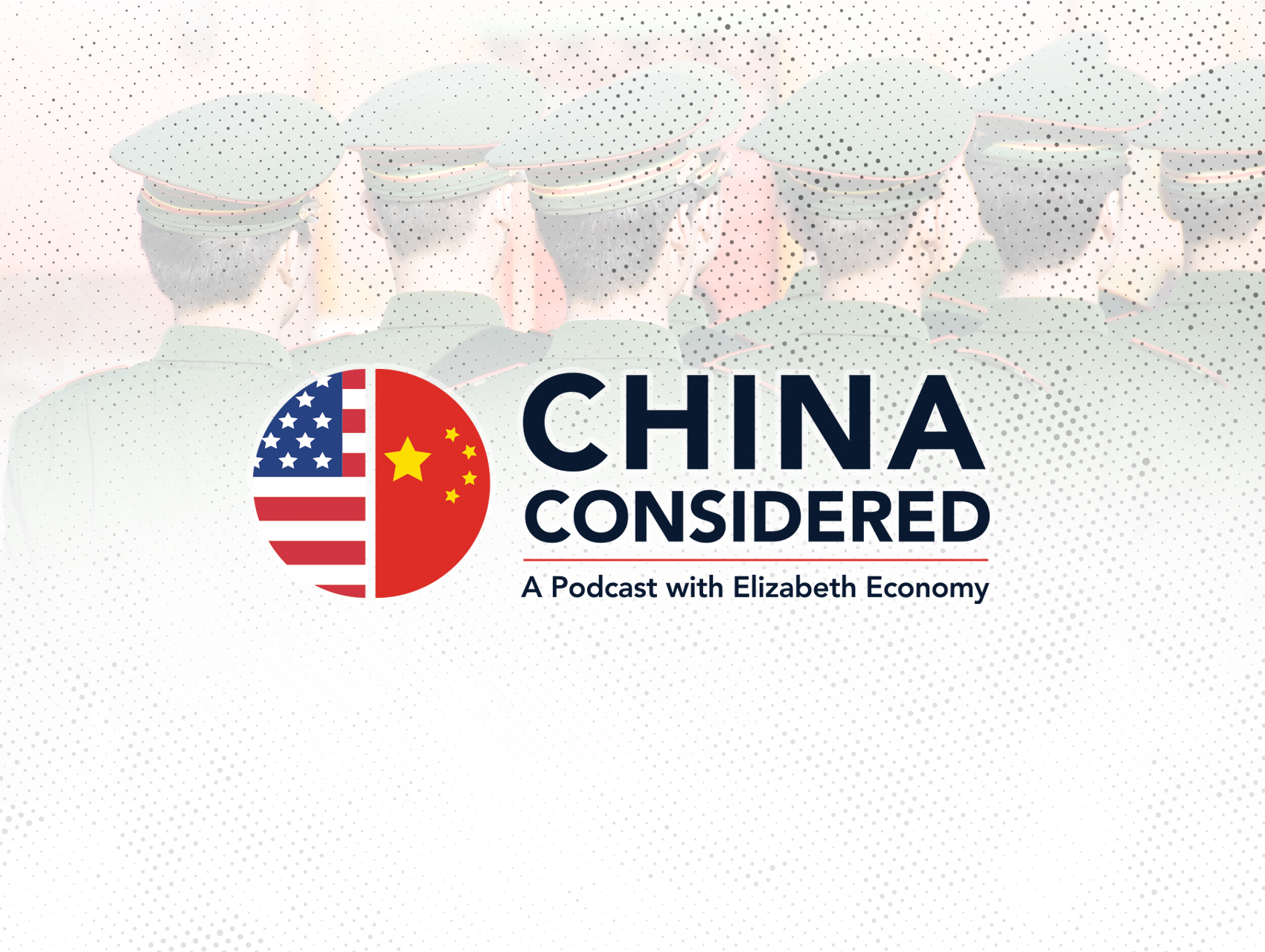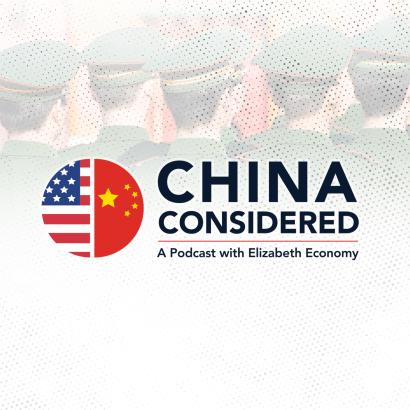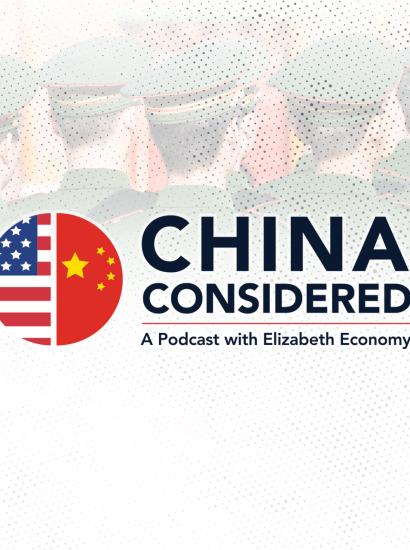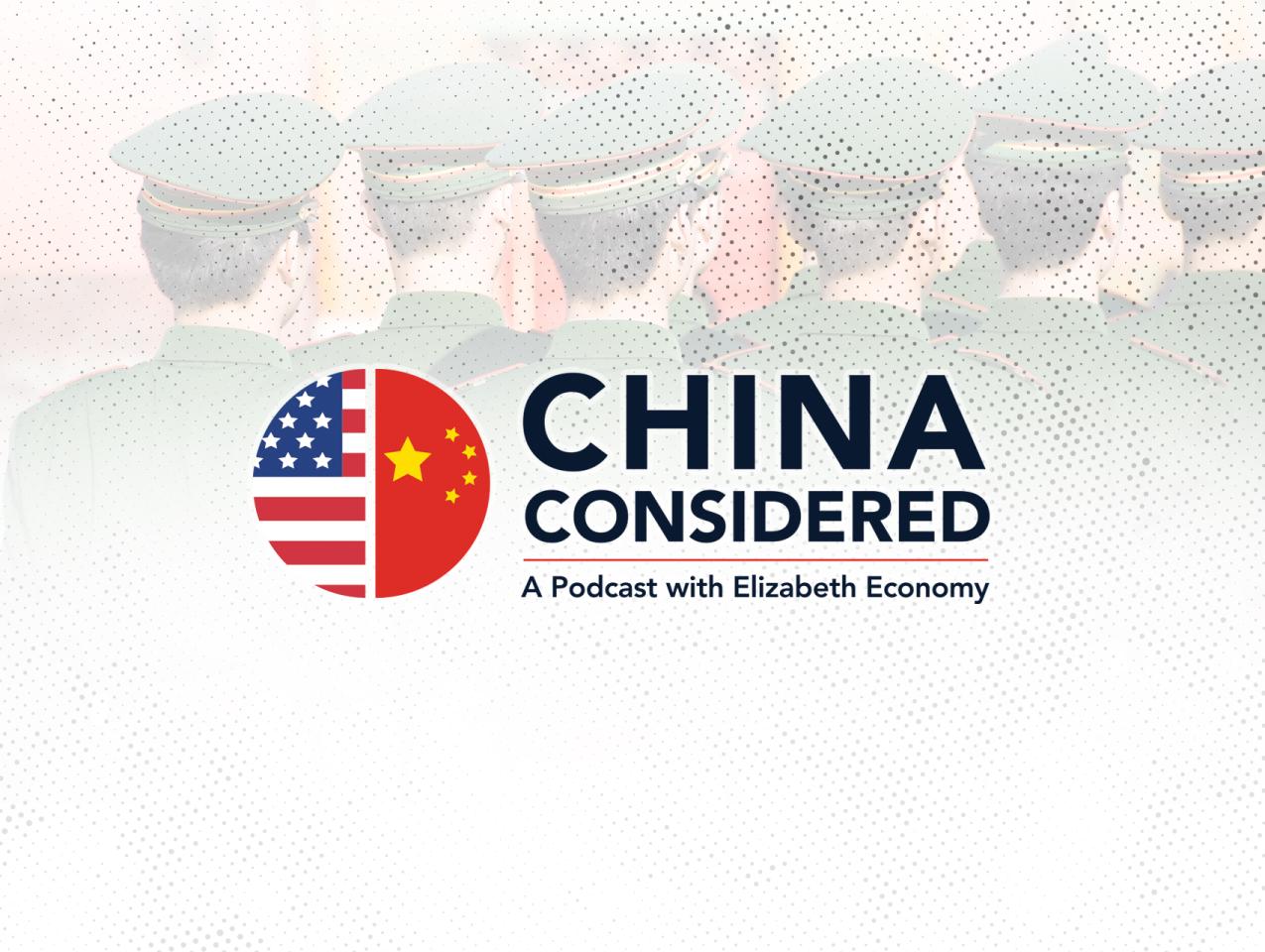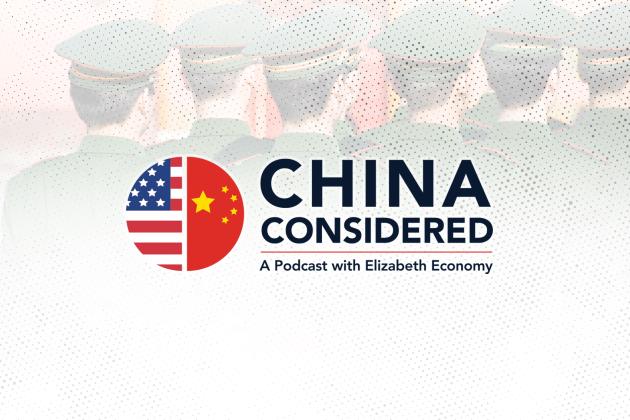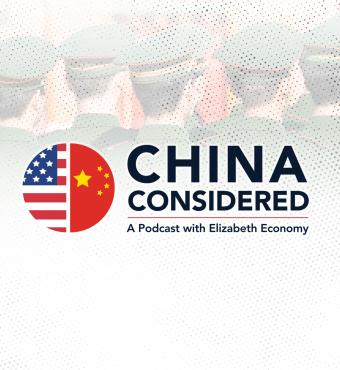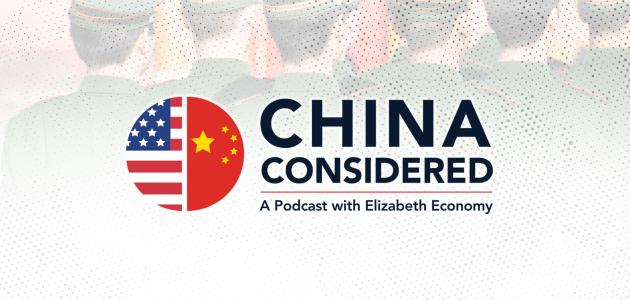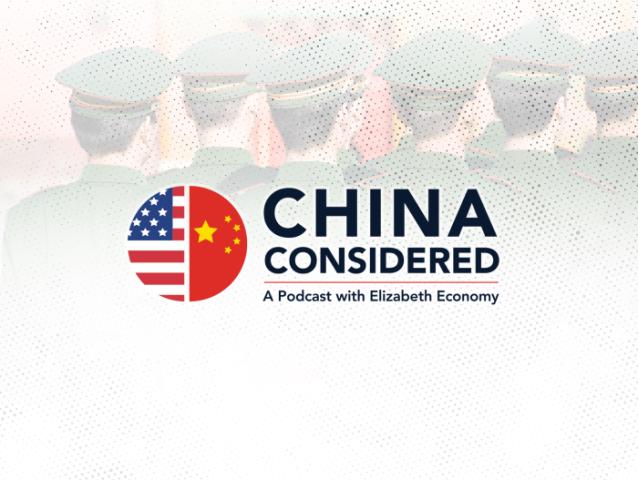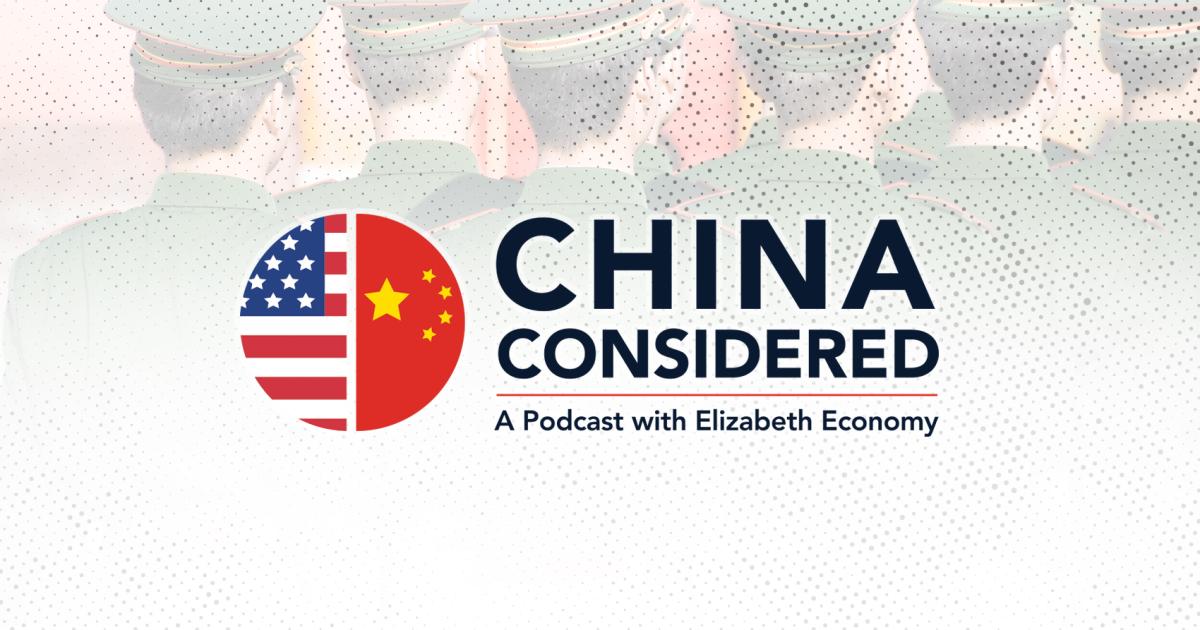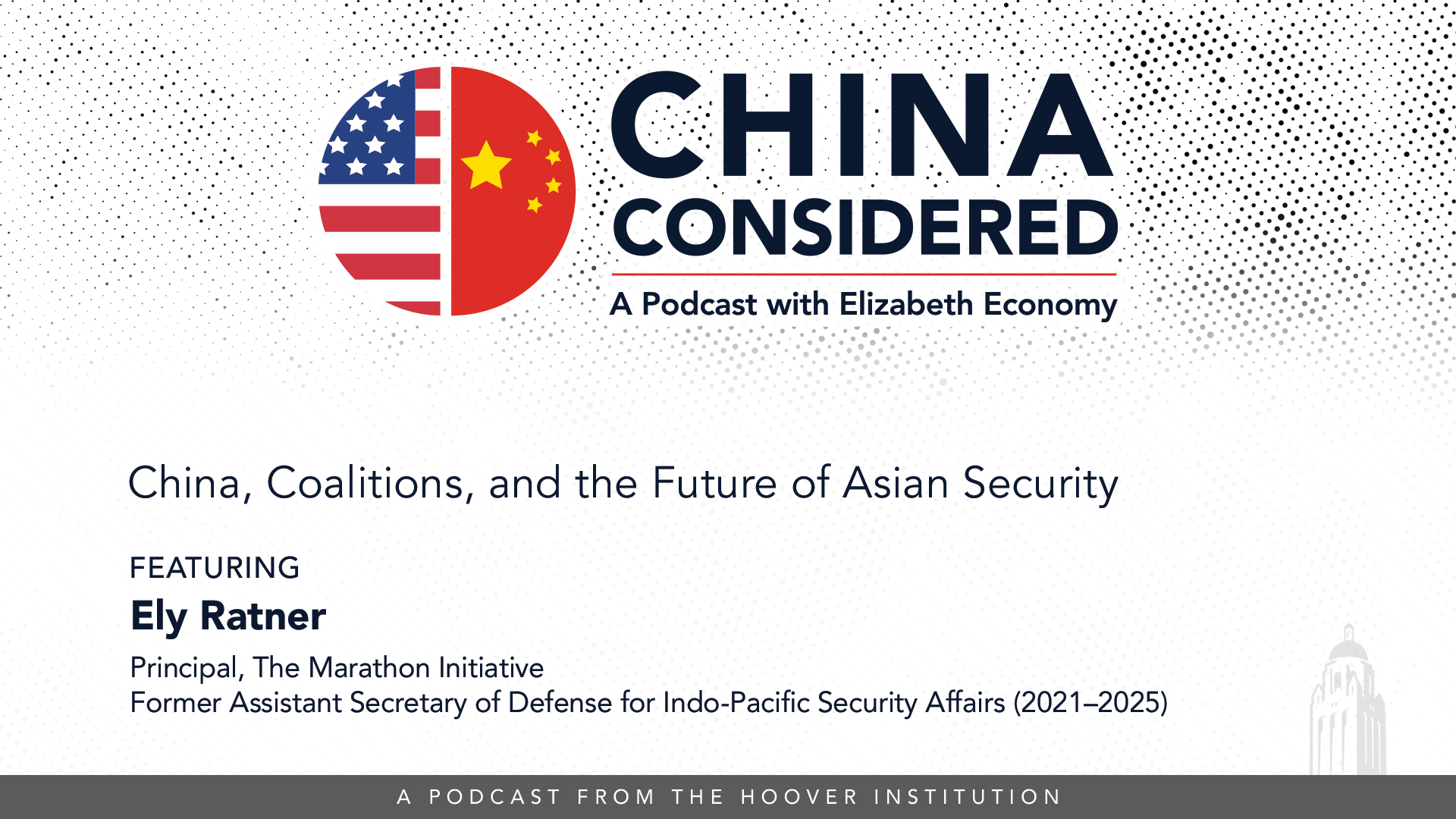- China
- US Foreign Policy
- Confronting and Competing with China
Dr. Elizabeth Economy and Ely Ratner sit down to discuss challenging security environment in the Indo-Pacific region, the specific goals and ambitions of China in the Western Pacific and East Asia, their experiences in the Biden Administration and the state of the alliance system in the region, based off his recent Foreign Affairs Piece, “The Case for a Pacific Defense Pact”. The two scholars touch on continuity between both the Biden and Trump administrations’ strategy in the Indo-Pacific, but also increasing intra-Asian cooperation and awareness between nations as the China threat grows. They conclude with a conversation about what a Pacific Defense Pact would look like, including the importance of long-term credible deterrence, how other partners could be brought in, and aligning objectives to help create a viable collective defense.
Recorded on June 11, 2025.
WATCH THE EPISODE
>> Elizabeth Economy: Welcome to China Considered, a podcast that brings fresh insight and informed discussion to one of the most consequential issues of our time: how China is changing and changing the world. I'm Liz Economy, Hargrove Senior Fellow and co-director of the program on the U.S.-China and the World at the Hoover Institution at Stanford University.
Today we're going to be talking about US national security, specifically what the United States should be doing in the Indo Pacific in the face of an increasingly powerful and assertive China. Most of the focus of the Trump administration for the past five months has been on trade and on the bilateral trade deficit, on what we should do about fentanyl and its precursors coming to the United States from China, and how we should balance our trade, our technology, and our national security.
But there are other issues in the US China relationship that also deserve our attention, like China's growing military capabilities and presence in the Indo Pacific. So to help us understand why this issue matters, what the Trump administration strategy is, and what more we should be doing, I'm delighted to welcome Dr. Ely Ratner.
Ely is a principal at the Marathon Initiative and formerly served as the Assistant Secretary of Defense for Indo-Pacific Security Affairs in the Biden administration. Welcome, Ely.
>> Ely Ratner: Great to be here, Liz.
>> Elizabeth Economy: So, Ely, let's start with the basics. What is the Indo Pacific and why should we care about it?
>> Ely Ratner: Well, maybe I'll just start from a defense and security perspective, since you've obviously talked to a lot of different experts about Asia and China. And from my perspective, looking out, what we see is a very challenging security environment insofar as for several decades we had great power peace in the Indo Pacific.
We had a system that was guided by US Alliances in the Indo Pacific and that provided the foundations for just the remarkable economic growth that we've seen throughout the region and, frankly, throughout the world. But what we've seen in the last few decades is big changes, obviously in the PRC with very rapid military modernization.
But that is not only just military modernization. The real challenge is that that has been conjoined with what we understand is, frankly, ambition in Beijing to reorder, refashion the international system. And you heard repeatedly during the Biden administration, whether it was in the national defense strategy or the national security strategy, that China was the only country in the world with both the will and increasingly the capability to change the international system in a way that would really disadvantage the United States.
So we see that potential coming, and it would happen in ways that could be very destabilizing to trade, to technology, and, frankly, to U.S. interests. So from the perspective of the Pentagon during the Biden administration, we articulated China as what we called the pacing challenge, which was the principal effort that the Pentagon needed to focus on to maintain peace and stability in the Indo Pacific.
>> Elizabeth Economy: So if you were to say sort of what are China's top three ambitions? You talked about sort of reordering the international system or reshaping the international system. But if you were just to focus on the Indo Pacific itself, what would you say were China's sort of top three ambitions for changing the structure of the relationships or the architecture there?
>> Ely Ratner: Well, I think the overriding goal is to dominate the Western Pacific and the East Asian littoral. And the specific objectives therein would be, number one, the seizure and control of Taiwan, number two, effective control of the South China Sea, and number three, undermining, breaking apart, if possible, but at least undermining and weakening US Alliances such that China had effective control of its periphery all the way up from the East China Sea down through the Taiwan Strait and through the South China Sea.
And thereby it's not just a military issue. Once you control the, the sea lanes, you are therefore controlling the flow of people and commerce and technology and ultimately diplomacy and politics as well.
>> Elizabeth Economy: And what do you see as its strategy for doing this? I mean, you mentioned it's got a very aggressive military buildup.
Is it building bases? Is it forging new security relationships with actors in the region? How's it going about trying to realize its objectives?
>> Ely Ratner: It's done a little bit, Liz, of what you just described in terms of trying to build stronger security ties with other countries. It is, has been pursuing overseas basing opportunities.
We could, we could talk about that separately. But primarily it has been building up its own capability to unilaterally achieve these objectives through aggression. And the way it's doing that is a little bit different vis a vis Taiwan or in other areas. But it has been very focused on building the capability to prevent the United States from being able to intervene into the Western Pacific to defend its allies and partners.
So that's at the high level of military operations. And then, as you know, it's been working in a, in a very coercive, day to day fashion through a combination of its military, its coast guard, what's called its maritime militia, civilian, supposedly civilian vessels that are coordinating with its defense agencies and bit by bit, chipping away at some of the norms and international law and sovereignty of other countries in the region to try to more slowly and incrementally achieve its goals.
So it is on the one hand, trying to achieve its revisionist aims without fighting, while also preparing for use aggression if necessary.
>> Elizabeth Economy: So you were one of the chief architects of the US Indo-Pacific Strategy during the Biden administration. How did you approach the challenge that you saw?
What were sort of the key elements of the Biden administration Indo Pacific strategy?
>> Ely Ratner: Well, the dominant principle was one of deterrence. So the primary question was how do we sustain stability and peace and how do we prevent Chinese aggression? So that's always important to point out because the United States does not have territorial ambitions in the Indo Pacific, it does not have offensive aims.
It's not planning to, for, for any reason attack China itself. So it's very much about defending the territorial status quo and defending the sovereignty of our allies and partners. So that's the overriding objective. The ways that we did that were through a variety of means designed to strengthen deterrence.
And for folks who aren't steeped in international relations theory, what that means very simply is ensuring that the costs of conflict are sufficiently high for Beijing that it chooses alternative paths to try to achieve its aims, that it does not reach for the military lever or does not choose aggression, because the costs of doing that would be beyond its willingness to do so.
And that was important because our understanding was that Beijing's aspirations, for instance, for Taiwan or in the South China Sea, were situated in the context of its goals for its overall development. So it was not yet willing to put at risk its entire economic growth or its diplomatic and political goals around the world to achieve these nearer term territorial ambitions.
So what that means is if the costs are sufficiently high from a military and economic and diplomatic perspective, then Xi Jinping would decide it wasn't worth it. One of the shorthands that you heard U.S officials use for that quite often is that we want Xi Jinping. To wake up in the morning, look out the window, consider the cost of conflict, and say to himself, you know what?
Today is not the day. The costs are too high, the risks are too high. So that was our goal, to strengthen deterrence. And the way that we did that was through a few different ways. One was through investing in US Capabilities that are particular to operational challenges in the Indo Pacific.
For many years, the US Military was focused on counterinsurgency and counterterrorism in the Middle East. So it has been a shift back to thinking about great power competition. And our budgets reflected that in the kind of things that we were investing in capabilities relevant to the Indo Pacific.
The Pentagon has also been developing new operational concepts, which just means the way that the US Military fights, which has had to be revised because of China's strategy, which has been designed in particular to defeat what I would describe as the old American way of war that we saw, for instance, in Operation Desert Storm in Iraq and other places in the post Cold War era.
So the United States needs not just new hardware, but also a new way of fighting. So new operational concepts. We also updated the US Force posture in the western Pacific, which means just the disposition of U.S. forces where they have been situated. We traditionally have had the predominance of our forces be in Northeast Asia at major operating bases in South Korea and Japan.
One of the things that we did throughout the Biden administration is developing a more distributed, more mobile, more resilient force posture that distributed within Japan, and then grew more opportunities for military operations, whether it's in the Philippines or Australia. So stretching out the US Troop presence in Asia in a way that increases deterrence.
And then finally, we worked with, and certainly not last, certainly not least, we worked with allies and partners in really unprecedented ways to try to make the whole greater than the sum of the parts. And we did that through a lot of different constellations of partnerships. But that was, I think, one of the notable achievements of the administration.
And just all of that collectively, I'll say. I mean, I think the way we thought about deterrence is that all of those activities collectively increased risk and cost sufficiently for China that we achieved. What we said at the time was that deterrence is real and deterrence is strong, and invasion of Taiwan in particular, we argued at the time, was neither imminent nor inevitable.
And we were right in that regard in terms of the period of the Biden administration. And I think that's the legacy that we handed off to the Trump administration of that strength and deterrence and we'll see if they can carry that forward.
>> Elizabeth Economy: Yeah, I mean, I think, you know, one of the things that was so striking to me looking at what was taking place in terms of our, you know, overall military strategy, was I think that last part that you raised, which was all those new arrangements like Aukus, right.
With the UK and Australia and the United States and then the minilaterals with Japan, the Philippines, the United States, South Korea, the United States and Japan, there just seemed to be this proliferation of arrangements that I think at some point somebody was calling a lattice. I don't think, I don't know that that name stuck, but it did seem that we were developing a kind of web or a sort of reinforced network of capabilities.
And, and also I think there was a sort of, it launched in some respects, new relationships among our partners. Right. So, so that notion that it was hub and spoke sort of didn't hold as much. I think it was a deliberate policy at the administration, correct me if I'm wrong, to enable and to support our allies and partners forming their own arrangements and their own set of sort of partnerships in the defense and security arena.
>> Ely Ratner: Yeah, yeah, I think you, you described it well. And it's a really, really important trend. And for those of work on East Asian security issues, it is an exciting time, frankly, because this is something that folks have been talking about for 15, 20 years as an aspiration that, hey, as you described, we have this hub and spoke model where unlike Europe, where we've got a big collective defense agreement in, in the United States or in, in Asia, the only formal security treaties outside of maybe one between China and North Korea are treaties that countries have singularly with the United States.
There are no Intra-Asian defense treaties. So. But what we did see, I think, you know, credit to the Biden administration for bringing partners together. But at the same time we were riding a wave of trends that was enabling this in ways never before. And, and one of those trends was that what we saw in our, our closest partner countries is that they themselves were becoming increasingly alarmed about the China challenge in terms of their, the direct threat to their interests, whether it was India, Australia, Japan, Philippines, others.
It wasn't the United States going into these meetings and saying, don't you realize that you're facing this threat from China? Or maybe that's what it was five, 10 years ago, that this time around it was fascinating for me to walk into these meetings and feel like the recitation we were hearing from our partners was very similar to what we were describing ourselves.
And so these countries in many ways were already underway in terms of their own strategic transformation. India talking about China rather than Pakistan as its primary national security threat. The Australians talking about the threat to Australia rather than believing that China was sort of this distant issue and its military ought to be off in the Middle east doing stabilization operations.
And of course, what we've seen in the Philippines, a total transformation from a defense strategy focused on internal security to one focused on external security. And then Japan in many ways leading the way in terms of thinking about some really fundamental changes to its historically much more reticent military and defense strategy.
So these changes are all underway, and the United States is meeting these countries in the middle where their partnerships are. And then second, exactly as you described, the degree of intra Asian cooperation has been really interesting and encouraging over the last several years. And that was also in the context of these partners wanting to work more with the United States.
So it was not a just a hedge or somehow a movement away from the United States, but it was behavior that was happening independent of Washington. And the, the relationship, for instance, between Australia and Japan, you have experts describing that as alliance like, and all of these new cooperative efforts and, and diplomatic efforts.
So you're right, we were able to harness those together. Rahm Emanuel and others did describe it as, as lattice work. I think we struggled to find the right metaphor for this kind of activity. But a web or a network, as you described, I think is the best description.
And really the important point of this is that as I would describe it, these are complementary and overlapping institutions. It was not that one was the prime at the expense of others. And that's important because with ASEAN there, the Southeast Asia centered regional organization, it was important to be seen as being complementary to what was going on in the region and not exclusive to that.
But I think these were more fit for purpose. And the different constellations of countries were in many ways working on problems that they could all unite around. And that was one of the important features. But it was a really exciting period. And I'll say it was a challenge too, from a strategic perspective, because we went from a period where, again, folks had been aspiring to have this kind of cooperation for a long time with our partners in these new ways.
And very quickly we went from just dialogue and meetings to actual military cooperation. And there was even an excess of opportunity all of a sudden. So it required more prioritization about, okay, which of these really matter if we're going to send our leaders together, how should we focus?
But a really important evolution in the regional security structure.
>> Elizabeth Economy: Okay, so I think you can safely say that you left office having dramatically improved the sort of security architecture in the Indo Pacific and the US Position within it. Enter the Trump administration. Early on, we heard talk of some spheres of influence, I think, leading some people to believe that the United States, you know, was simply going to be focused on north and South America.
We were basically ceding Europe to Russia, and China was going to have the Asia or the Indo Pacific. But I think that's not quite right. And I think what we've seen, and I want to get your take on this, is that, you know, Secretary Hexa, Secretary of Defense Hexa, former National Security Advisor Waltz, Secretary of State Rubio, really, you know, quietly.
And then I think with Secretary Hegseth's speech at Shangri La dialogue, not so quietly. What they seem to be doing sounds a lot like what the Biden administration was doing. It seems that there's more continuity than change. Doesn't seem as though we're actually ceding the Indo or the Asia Pacific to China, and that maybe our sort of position with regard to Russia and Europe is different from our position with regard to China and the Indo or Asia Pacific.
So how do you understand the Trump administration strategy? I haven't seen a great articulation of it, except for Secretary Hegseth's speech at Shangri La. I don't know whether you were there, but I'd be interested to get your take on what exactly how you think that the strategy is shaping up.
>> Ely Ratner: Yeah, again, I think you've, you've provided a good context there, Liz. The I don't think yet we have seen either a coherent presentation of a singular grand strategy from the Trump administration or for that matter, of a, of a China strategy per se. I think we have seen different elements of that on the defense and security space.
I think there is a little more clarity, which is what you're describing, which is that a lot of the early moves by the Trump administration, particularly as it relates to NATO and Europe, did present a certain orientation and skepticism toward alliances and partnerships. And folks frankly were watching to see how would that map on to the Indo Pacific.
And thankfully, from my perspective, I think it has looked quite different that the Secretary Hegseth first made his first trip to the region to Philippines and Japan, and sent a very traditional message there of US Commitment to the region. And then as you mentioned just recently out in Singapore for the Shangri La dialogue, articulated a set of priorities on defense policy.
Now, there were parts of the speech that were uniquely to the Trump administration, but when it came to the part of the speech of okay, on a no kidding activities, operations, exercises perspective, defense and security policy perspective, what are the priorities of the administration? And what they ticked through were very familiar focus areas that, that we were working on over the last several years, including force posture, as I described that building out that more distributed, mobile, resilient, lethal force posture, more cooperation on defense industrial base and efforts to strengthen the capabilities of our allies and partners, and many of the activities that Secretary Hegseth has advanced, broadened, strengthened, continued, do have their roots in the Biden administration.
So I think that that's a good thing. And the overriding message of one of US Commitment to the region and US Commitment to allies and partners was welcome in the region and is a good message. So I do hope that continues. The challenge, of course, is that in the areas of economics and foreign assistance and on some other diplomatic measures, you do have actions that are being taken that are creating a lot of stir and tension within these broader bilateral relationships in the region.
And I think the question is what is the push and pull going to be between what seems to be an effort in Washington, but also in the region to continue on the defense cooperation and the security cooperation because of the challenges from China and North Korea as well, but from particularly from China?
On the one hand, that has a very strong motivator behind it. On the other hand, some of the economic and trade and tariff issues do create headwinds. So at what point do the politics and the economics of the tariffs become so overriding that they become very negative upon the trade the defense and security, that's a big question.
It hasn't happened yet. So the, the ability to silo, we have seen to date, but there are probably limits to that. But to your broader question, I think for now we have seen relative continuity and, and also reporting that the Trump administration has put out an interim national defense strategy internally to the department with China as a priority for the department.
And that national defense strategy is reportedly due to the secretary at the end of August. So we may see the first formal articulation of at least defense strategy, if not a national security strategy, by the end of the summer.
>> Elizabeth Economy: Let me ask you, because, you know, in the trade space, of course, you know, people were describing the range of perspectives within the cabinet and among the sort of senior advisors as, you know, a team of rivals, right.
You had very different perspectives. Everybody from deeply engaged in trade with China on the sort of Elon Musk side to Peter Navarro, who would be, forget about strategic decoupling, let's just decouple the two economies. I mean, do you sense that there's a similar debate or range of perspectives on the defense and security side when it comes to the Indo Pacific?
I mean, I have been struck by some of the appointments that seem to be more in the Taiwan doesn't need to be a, you know, strategic national priority for the United States. It's not essential to our national security. You know, there seems to be a little bit of difference of opinion.
If you look at some voices in the administration again, they, they don't seem to be, you know, at the forefront right now. But I wonder whether you have any thoughts about, you know, is there a kind of team of rivals as well on the security and defense part when it comes to our China security strategy?
>> Ely Ratner: I think there, there are different perspectives throughout the administration as, as you've described. And there, there are folks who come from more of a, what's often called a restrainer background which wants to see the United States less involved in international affairs. I think that is predominantly been a reaction to wars in Iraq and Afghanistan and some of our policies in the Middle east and even possibly some of the ways in which we've been engaged in Ukraine.
So in some ways that element or that national security orientation has been more focused on reducing or undoing commitments in other parts of the world and hasn't always been very focused on the Indo Pacific. So I think the arguments of that community are maybe stronger, more strongly applied to other places.
You do have the prioritizers or the China hawks or as they're described, who want to put forward a, a national security strategy more focused on China. And then I think you have folks in the administration who aren't particularly concerned about geopolitics in general and come to the region with that economic orientation.
So I think we are seeing different bits and pieces of that. But at least the Pentagon seems to be driving pretty clearly from a prioritization perspective of the prc. And we have, like you said, some of those more skeptical voices may still be existent, but haven't, haven't really manifested themselves.
But I think it is the interplay in part between the national security folks and the economic policy folks that, that may be determinative here.
>> Elizabeth Economy: Okay, so I think that's a perfect segue to your great piece in foreign affairs calling for a Pacific Defense Act. I think it threads the needle in ways that really smart between not actually committing us to too much more in ways that might appeal to those restrainers, but also being forward leaning and actually doing things that bolster our security and the security of our allies and partners.
So talk to us about what the specific security or defense pact would actually look like.
>> Ely Ratner: Yeah, happy to, happy to do that. And this is all building upon the earlier part of our conversation about the trends of greater strategic alignment between the United States and some of its core partners vis a vis the China challenge, and then that growing intra Asian cooperation as well.
And thinking about as we were doing that building of networks, that building of webs, that lattice work. How do we think about that in terms of a longer term strategy? And it's my view that the Biden administration was a really important period in terms of generating momentum in that regard, but that the existing panoply of informal organizations is not going to be sufficient in the long term for true combat credible deterrence because it is Important it is bringing our allies together.
In terms of the current mechanisms. We do have some cooperative product projects, but when you come, when it comes to no kidding, military operations and exercises, it isn't. It lacks the formality that you need to actually do no kidding, command and control, no kidding military planning, operations and exercises, et cetera.
So to truly achieve what we're going to need in terms of that whole being greater than the sum of the parts, we need more formal military mechanisms. It can't just be a sort of a pickup game that happens every once in a while. So the proposal that I put forward in Foreign affairs said, look, we need to move in this direction.
The military challenge from China is sufficient that it's going to require more focused deterrent power from allies and partners. And if you look historically, there have been both conceptual and real efforts to try to build some kind of collective defense or multilateral security organization in the past. But it all, it has always stumbled over the fact that it's a very big region, you've got a lot of different kinds of partners with different kinds of interests, and a pan regional organization like NATO doesn't make sense in the Indo Pacific.
So one of the important parts of the proposal that I put forward, it is limited on at least starting with the core group of Australia, Japan, Philippines and the United States as that set of countries that is most aligned on the challenge and most cooperatively working together already and most prepared to be moving forward in a collective defense arrangement.
So that's the proposal so far. I also think, you know, one aspect of this that we haven't talked about so far that we did hear from Secretary Hegseth in Singapore has been a call for US Allies and partners to do more in these relationships. That the context has changed, the military is balance has changed, and it's not going to work anymore to have a region essentially configured such that the United States is the primary defender of our allies and partners.
We need to be doing that more together. They need to be stepping up more. And that is a, I think, a shared view on both sides of the aisle. I don't think that's just. And frankly, among the American people and public opinion polling, they like alliances, but they want the allies to be contributing more in the strategic and political environment is calling for that.
So as they're stepping up too, as they're working more with each other and as we're all more aligned on China, I think it creates the context for an actual viable collective defense arrangement that hasn't been necessarily possible historically.
>> Elizabeth Economy: So One of the things that surprised me when I, when as I was reading through, you know, and then you address it a little bit later is I think, what about South Korea, you know, or how to bring in Vietnam?
I mean, there are clearly other, you know, allies and partners that, you know, we'd want to have included in some form. Is it a matter of sequencing where you're starting with, you know, these four and then you would imagine bringing others in as time goes on, or are there sort of tangential ways that they can be aligned with, if not formally in the organization?
>> Ely Ratner: Well, I would say yes to all of those things. So first thing to say again is that this is not the proposal, is not that this is the end all and be all of security cooperation in the region and everyone else be damned, that US Alliances with Korea, cooperation with Korea and Japan in the Quad Aukus, all of those other configurations could still continue.
So this is not again, at the expense of other relationships and partnerships and whatnot. But the Korea question, the South Korea question is a really good one. I think. You're not alone. It's the question I get most frequently from a perspective of the membership question. And the answer is, look, it's a decision for Seoul.
It's not a decision for Washington and South Korea's even, even prior to the election they've just had that has brought in a more progressive government, even under conservative, national security minded, what some would consider hawkish, defense oriented governments. In Seoul, their focus has been almost squarely on North Korea and they have been hesitant to be engaging in what regional security cooperation that distracts them from that or takes a sharper position at times against China.
So that was something we tried to advance during the Biden administration to draw and work with South Korea in other parts of the region. Their own national security strategy called for that themselves to be doing more in Southeast Asia and the Pacific islands. But those efforts are very nascent.
They have a vibrant defense industrial base. They're active on security cooperation, but from an operational perspective with their military, they have yet to be a really robust partner in the South China Sea or the East China Sea. So they would have to reorient their national defense and security strategy in a pretty significant way away from that singular focus on North Korea.
And they would also have to be willing to work with Japan and cooperate with Japan more than they have to date. So my answer would be the door is absolutely open. They would make a splendid contribution, but I'm not. I'm not sure they're ready to walk through that door.
And there are others like New Zealand, who potentially, over time, might be interested in, in joining an organization like this. And then I think the way that you described it is right, that for other countries, whether it's India or Vietnam, there could be opportunities to plug in in various ways as we have informal observers or other types of participants and regional organizations.
But I think as it stands now, a country like India or Vietnam is not going to be willing to join a security pact, period, much less one that is quite focused on, on the China challenge. But that's okay. And I think waiting for all of the stars to align of every US Ally and partner in the region is going to leave us waiting for Godot here.
So I think it's important that we, you know, move forward with a ready constellation. And frankly, if you look at the combination of Australia and Japan and the Philippines, I think you get a lot of the way that you need to go. Again, if we're talking about the practicalities of deterrence in the western Pacific, that set of countries provides a very strong foundation.
>> Elizabeth Economy: Yeah, no, I thought it was an exciting idea. Another thing that struck me, it reminded me a little bit of that moment in the Biden administration where there seemed to be a push for closer coordination between our Asian allies and partners and NATO. And, and then it seemed as though it didn't get quite the formal construct that maybe we were hoping for.
But I guess I'm asking, do you see the potential then for involvement from European allies and partners in this construct, as you say, not, not immediately, not initially, but would you see that as a, as a positive, or would it be something that you think would trigger China in a way that would be more dangerous than not?
How do you think about that, you know, sort of bridge from, from the Indo Pacific to Europe and the kind of coordination and cooperation that might be useful?
>> Ely Ratner: Yeah, so those are Two really important questions. And let me answer specifically as it relates to the pac, but I want to broaden that out a little bit because I think it's an important question strategically.
I agree with the Trump administration's general focus vis a vis Europe. To say Europe you got to, you should be focused primarily on Europe in terms of a defense partner that is not at the exclusion of cooperation in the Indo Pacific. But I think the it is important for the Europeans to be playing a much more significant role on the continent.
And right now, conceiving of European powers playing a really significant operational role in the Indo Pacific in a sort of a planning perspective, I think is probably a bridge too far. So I would say I think that's important to look at down the road. It's not something that I would reach for right this minute more broadly to sort of caveat further what I just said about Europe's role.
I do think the we have seen reporting that the Trump administration has been really skeptical of the value of Europe at all participating in the Indo Pacific. And I think they just need to be more flexible in that regard. And I think we're seeing some of that already.
And in fact, Secretary Hegseth was asked about this out in Singapore during the Shangri La dialogue, and he gave a much more nuanced answer about, well, there probably are some opportunities where Europe could make important contributions that was less ideologically rigid than some of the earlier statements that we had heard.
So I think that's really good because again, I don't think that Europe's going to have in the short term a really big war fighting role in the Indo Pacific. But absolutely they have a role to play in strengthening Taiwan's defense and resilience. So there are unique capabilities that they can be providing to Taiwan to strengthen deterrence across the Taiwan Strait.
They can also be engaging in operational activity like Taiwan Strait transits, freedom of navigation operations.
>> Elizabeth Economy: Why wouldn't we want them doing that, right? I mean, is the press-
>> Ely Ratner: Exactly. No, I mean, I mean, the argument is some folks say that's drawing away from the work they need to be doing in Europe.
But I think we can, I think we can do both if it's, if it's sufficiently measured. Because I think the issue here is a little bit from Europe goes a really long way in the Indo Pacific. And then there are areas like the Pacific Islands, the French are a resident power there, that, that Europe can play an important role as well, not to mention sort of in the exercise space as well, where we've seen European powers operating with the United States and others in a collective fashion that has deterrence power.
So again, I think there are meaningful, properly scaled contributions that Europe can and should be making to the Indo Pacific. And also it's not Washington's role or ability to tell Europe what they can and can't do. So the other thing that happened out in Shangri La is we had President Macron there giving the keynote that had elements of strategic autonomy and, and Europe as an alternative power to the United States and Asia.
And that is not in America's interest to have Europe be a straight up competitor in Asia. And in many ways we want to be cooperating with Europe as it relates to the China challenge. So it's not if they're going to be doing it anyway, we ought to be coordinating and cooperating as they do it.
>> Elizabeth Economy: Yeah, 100%. So let me ask you one last question here and have you previewed or did you preview this idea with any of your allies and partners in the region? Like, had the Australians or the Japanese or the Filipinos actually heard this idea from you before? And if so, what did they say?
Or maybe you've, you've heard from them since the article was published. So I'm just curious, what is the regional reaction?
>> Ely Ratner: It's been interesting. You know, a lot of it is very quietly behind closed doors. I can't say this in public, but you're right, absolutely, we have to do this.
Others are saying, you know, thank you for opening up this debate, which frankly, was the purpose of the article. The article was not to hand over a blueprint, go ahead and do this. It was to generate a discussion about an idea that has been batted around for a long time.
And this was an argument for why the time may have come and we ought to have a serious discussion about this. So I've heard from a lot of quarters in the U.S. government, in the U.S. military, among our allies and partners that are very encouraging. At the same time, political leaders in Canberra and elsewhere are dealing with some of those economic and political tensions.
And it's hard for them to lean forward right now and say, you know, now's the time that we need to do something really ambitious with the United States. So aligning the politics to actually do something like this will take a lot of leadership and the right sort of political moment.
But at the same time, one of the things that is embedded in the article is the point that a lot of the foundation for something like this, the pieces are already being built. And so this is to say, let's accelerate, let's keep going, let's be focused. And as we build our cooperative elements out in the Indo Pacific, whether it's new command and control efforts in Japan or in the Philippines, or new intelligence sharing mechanisms.
Or maritime domain awareness operations, that we think about how to ensure that we are either including or can include this constellation of partners. And so the foundation, the defense establishments, can continue moving forward on this without necessarily political leaders putting up a, a big banner. And frankly, also, the amount of work that needs to be done between now and the actual rollout of an initiative like this means that, in practice.
It could be something that happens subsequent to Donald Trump's second term as it relates to the calendar. So maybe that would open up political imagination for people as well. But I recognize the challenging political environment. That's something that people always say, how could you be proposing something like this at a time where the Trump administration is so hostile to our alliances?
And the response to that in part is, look at what's actually happening in the Indo-Pacific, which is a story of continuity and moving forward. And also, yeah, we got to figure out how we're gonna work on to align the economic piece with the security piece. So recognize the challenges.
But I think the need for it is so great. And the sort of megatrends that are bigger than the Trump administration are driving us toward this anyway.
>> Elizabeth Economy: Yeah and I mean, I think again, one of the really smart things in the article is that it doesn't call out for a huge new investment of US Military resources and funding.
That's not the centerpiece of your argument, right? What it really is about is coordination, working together, aligning, command and control, doing these kinds of things. And so to the, you're not saying we need to be spending more, as the centerpiece of this new Pacific defense pact. And I think that's got to be an appealing element for the Trump administration.
But as you say.
>> Ely Ratner: Not only that. Let me, let me just build on that for two seconds because it's worth saying one more thing about this, which is from the allies perspective, they already have a treaty with the United States. They already have a defense treaty with Donald Trump's United States.
And so that already exists what we're talking about here. The real novel innovation here is actually the intra Asian connections and formalizing mutual obligation between the partners. And in many ways that's something that should be an attract, that should be even more attractive in an environment where there are questions about where the United States might come down on some of these issues.
So the, the big leap is between the Asian partners. And exactly as you're right, exactly as you're describing from the US perspective, there are no new obligations or spending.
>> Elizabeth Economy: Yeah, okay, so I always end with a couple of quick questions just to get your, your thoughts and your input so that our listeners can take away some additional piece of advice.
So when you think about the China space and what article or book would you recommend to our listeners? What should they read to get maybe more up to speed on the kinds of issues that you're talking about?
>> Ely Ratner: Well, maybe I'll give you a book that was instructive to me as I've been coming up through the field and it's not one about sort of the guns and bombs of the PLA.
But I really enjoyed Evan Osnos's book Age of Ambition, which is now maybe 10 plus years old, if not quite a bit older than that, which was I think, just really interesting to hear about the people in China. And how they're experiencing all the different forces that are driving through that country.
Having lived there myself and traveled extensively around the country. Even though the writing that I do and the work that I do is often at the national level and the geopolitical level and about big structural forces. Understanding what life in reality looks like on the ground in that country at an individual level, I think, is really important and super interesting.
So that is something that has always stuck with me and I always enjoy those kinds of books.
>> Elizabeth Economy: Yeah, it was a great book and was of course a national Book Award winning.
>> Ely Ratner: Right, so it's not just me, I guess. Yeah, so and he's sort of a good writer too, that guy.
I don't know if anyone heard of him.
>> Elizabeth Economy: And so that you and millions of other people would.
>> Ely Ratner: Yes, so maybe all your viewers have already read it, but if not, go to your local library. And then the other, I would just say the other thing that I enjoy reading as somebody who is not deeply steeped in economics, is all the work coming out of the Rhodium Group and Dan Rosen.
I think they're doing some of the most interesting on the ground economic analysis. So much of what we read about the Chinese economy is coming from officialdom, and I think they have a great job, do a great job of sort of cutting through that with a different perspective.
So I consume all of their work every chance I get.
>> Elizabeth Economy: Yeah, 100% and actually, you had Dan on the podcast earlier this year. Okay, if there's an issue that you think that we need to know more about when it comes to China and we don't, what would that be?
>> Ely Ratner: Well, I would say one issue that I have been increasingly interested in talking to allies and partners has been the role of Chinese influence in democracies around the Indo Pacific. It is interesting to me, having been the role that I was in before and continuing some of those conversations with allies and partners.
It's really fascinating the degree to which, whether it's Australia, Taiwan, Philippines, Indonesia, India, all of these leaders. They're worried about the national security issues and the external defense issues. But they're also really worried about what's happening in their own politics in terms of the ways in which parts of the Chinese system are affecting and manipulating their media environment, their political environment.
And they're all going through it on a very individual basis, but it's a pattern that's replicated throughout the region. So I know that there are folks who have worked on this issue and studied this issue. But from a policy and strategy perspective, it feels to me like one that merits a little bit more attention because of the really significant effect that it's gonna have on not only our allies and partners, but on US interests as well.
>> Elizabeth Economy: Yeah, I agree. I mean, some countries in the region, like Australia, certainly Australia was really the canary in the coal mine, I think, when it, comes to this issue. But there are many others that are probably not have not mounted as robust a research or defense effort as they probably need to.
Okay, one last question. What do you think is the likelihood of a Nixon Mao sort of transformative moment in the US China relationship between Xi Jinping and Donald Trump?
>> Ely Ratner: I would score it as relatively low, and I don't think that's because of Donald Trump. We may get something that is announced or looks or pretends to be some very significant historic breakthrough.
But my personal perspective on these issues, Liz, as is that the United States and China have competing visions of the future. I don't think there is a lot of overlap in our Venn diagrams of our preferred outcomes for the Indo Pacific. And I think it's a challenge of competing interests that will need to be wrestled out over time.
And I don't think at this point there is a grand strategic bargain to be struck. So if one were announced or attempted, I don't think it would sustain for very long. And we're just gonna have to work through this period and with the proposals we've been talking about today.
Try to find a way to thread the needle to maintain peace and stability through a period that, from my perspective, will be a very contested environment that in some ways, is separated from the personalities of the leaders themselves.
>> Elizabeth Economy: Well, Ely I can't thank you enough for taking the time to speak with me today and for sharing really just a fascinating set of insights and vision, I think, for the future of Indo-Pacific security.
I think you are always on the cutting edge when it comes to thinking about new ideas for the United States and what we need to do to advance our regional security. So really appreciate your ideas and your time and of course, your service and look forward to the next administration when perhaps you won't just be Assistant Secretary of Defense.
But who knows what role you might play in the next Democratic administration? So thank you so much for joining us.
>> Ely Ratner: Yeah, thanks so much, Liz. Great discussion.
>> Elizabeth Economy: So if you enjoyed this podcast and want to hear more reasoned discourse and debate on China, I encourage you to subscribe to China Considered via The Hoover Institution YouTube channel or podcast platform of your choice.
ABOUT THE SPEAKERS
Ely Ratner is Principal at the Marathon Initiative. From 2021 to 2025, he served as Assistant Secretary of Defense for Indo-Pacific Security Affairs in the Biden administration. From 2015 to 2017, he was Deputy National Security Adviser to then-Vice President Joe Biden. He previously served in the State Department’s office of Chinese and Mongolian affairs and as a staff member on the Senate Foreign Relations Committee. He previously held the Maurice R. Greenberg Senior Fellowship for China studies at the Council on Foreign Relations and was Executive Vice President and Director of Studies at the Center for a New American Security.
Elizabeth Economy is the Hargrove Senior Fellow and co-director of the Program on the US, China, and the World at the Hoover Institution. From 2021-2023, she took leave from Hoover to serve as the senior advisor for China to the US Secretary of Commerce. Before joining Hoover, she was the C.V. Starr Senior Fellow and director, Asia Studies at the Council on Foreign Relations. She is the author of four books on China, including most recently The World According to China (Polity, 2021), and the co-editor of two volumes. She serves on the boards of the National Endowment for Democracy and the National Committee on US-China Relations. She is a member of the Aspen Strategy Group and Council on Foreign Relations and serves as a book reviewer for Foreign Affairs.
FOLLOW OUR GUEST ON SOCIAL MEDIA
-
Follow Ely Ratner on LinkedIn (Ely Ratner) and on X (@ElyRatner)
ABOUT THE SERIES
China Considered with Elizabeth Economy is a Hoover Institution podcast series that features in-depth conversations with leading political figures, scholars, and activists from around the world. The series explores the ideas, events, and forces shaping China’s future and its global relationships, offering high-level expertise, clear-eyed analysis, and valuable insights to demystify China’s evolving dynamics and what they may mean for ordinary citizens and key decision makers across societies, governments, and the private sector.







